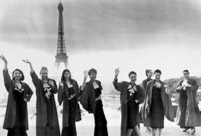 Fighters of Lanzhou MAC in confrontation training
Fighters of Lanzhou MAC in confrontation training
 3D printing to trigger third industrial revolution
3D printing to trigger third industrial revolution
 Top 10 brands that win rich women's hearts
Top 10 brands that win rich women's hearts
 Deng Xiaoping: 'I have a clear conscience all my life'
Deng Xiaoping: 'I have a clear conscience all my life'
 Xi Jinping: 'The people are our strength'
Xi Jinping: 'The people are our strength'
 Amazing cliff diving in cold winter
Amazing cliff diving in cold winter
 Enjoy Sochi 2014 in slow motion
Enjoy Sochi 2014 in slow motion
 University student sentenced to death for poisoning roommate
University student sentenced to death for poisoning roommate
 Chinese lunar New Year celebrated in San Francisco
Chinese lunar New Year celebrated in San Francisco
BEIJING, March 3 -- On the corner of Oxford Street, a posh shopping area in London, stands a six-story, ultra-glossy architecture. It is the flagship store and brand headquarters for Bosideng, China's largest down apparel manufacturer.
From rabbit fur-collared down jackets to pure cashmere cardigans, Bosideng London presents to the world a Chinese brand of quality, sophistication and fashion.
Companies like Bosideng are exactly what China needs when delegates to the country's annual "two sessions" gather in Beijing in the following two weeks to discuss, among other things, how to upgrade the world's second largest economy as part of efforts to deepen reforms in a comprehensive way.
The "two sessions" refer to the annual meetings of the National People's Congress and the National Committee of the Chinese People's Political Consultative Conference.
Besides Bosideng, many other Chinese companies are also eager to reinvent the "Made in China" label. They are pushing ahead with a branding strategy to gain a foothold even in the most competitive markets in the West.
Lenovo, a Beijing-based tech giant, took over Motorola's handset unit in January, nearly a decade after buying IBM's ThinkPad business. The acquisition is expected to allow the world's largest PC vendor to become the world's No. 3 smartphone maker.
In another example of China's global business ambition, Shuanghui International, China's giant meat producer, merged with the biggest name in the U.S. pork industry, Smithfield Foods, last year, completing the most valuable Chinese corporate purchase ever in the United States.
China is redefining its position in the global economy, edging up in the value chain from being the factory of the world, said Li Guoxue, a researcher at the Chinese Academy of Social Sciences.
Chinese enterprises tapping into a global market are likely to get a boost this year as the country moves toward deeper and more comprehensive reforms, experts said.
TECH RISE
The rise of China's technology companies in the global business contest is an epitome of the country's increasing competitiveness and growing entrepreneurship outside its home turf.
WeChat, a messaging app for smartphones made by Tencent in China, is the 10th most popular social media in terms of monthly active users -- just behind Twitter, according to GlobalWebIndex.
Available in 18 languages, the app has been a strong rival of WhatsApp and Line in Southeast Asia, India, Italy and Latin America. It achieved a record 379 percent growth of international users, topping social network growth between the second and fourth quarters in 2013, said GlobalWebIndex.
"I can tell you that I love using WeChat!" Mark Otto, a trader at the New York Stock Exchange and partner of J. Streicher & Co., told Xinhua. "It's a great way to stay connected with my inner circle of friends. I have used it in social as well as business purposes."
Anthony Alvarez, a director at Pucho Web Solutions, said it is good that Chinese Internet companies are profitable.
Hopefully they will increase research and development budgets to enable future growth, he added.
Experts have cautioned that a brand is not built in a day. Chinese companies, despite their hunger for foreign markets and lavish purchases overseas, have to be innovative in marketing, product development and operations to gain advantage over established brands in the West. "The competition is tough," said Alvarez.
Huawei, a Shenzhen-based technology company, is poised to build a global brand based on value and quality. It has a 70,000-strong global R&D team and ranks among the top five companies for numbers of patents.
In mid-2013, it unveiled what it said the world's thinnest smartphone, hoping to take on high-end rivals like Apple and Samsung in the global market.
"Our theme for this product is elegance with an edge," Richard Yu, chief executive of Huawei's consumer business group, said in London at the launch of the super-slim, 6.18mm-thick handset.
The company, operating in 140 countries and regions with two thirds of its sales outside China, is the world's second largest provider of carrier network infrastructure after Sweden's Ericsson. But even Yu acknowledged: "We need time to build our brand and win the trust of consumers."
Jens-Peter Otto, leader of China Business Group in PwC Germany, said: "Brand image is really something that will take decades to establish. It won't come overnight. It won't come with one or two brands."
"It really needs to be on a very broad level with thousands of companies fulfilling the promise of high quality over a long period, before 'Made in China' becomes a synonym for high quality," he told Xinhua.
 Old photos: Precious moments in Sino-French ties I
Old photos: Precious moments in Sino-French ties I Belgians warmly welcome arrival of China's giant pandas
Belgians warmly welcome arrival of China's giant pandas Photos: Top 10 pure beauties in showbiz
Photos: Top 10 pure beauties in showbiz Chinese Dream: the Chinese Spirit and the Chinese Way
Chinese Dream: the Chinese Spirit and the Chinese Way 51 bronze sacrificial utensils unearthed in Shaanxi
51 bronze sacrificial utensils unearthed in Shaanxi Most gorgeous female celebs in Chi-pao
Most gorgeous female celebs in Chi-pao Second round of test kicks off at Beijing Film Academy
Second round of test kicks off at Beijing Film Academy Ancient Qiang people had vertically grown teeth
Ancient Qiang people had vertically grown teeth Top 10 Chinese youth’s favorite seaside destinations
Top 10 Chinese youth’s favorite seaside destinations Sacrificial altar unearthed in China's Shannxi
Sacrificial altar unearthed in China's Shannxi Chinese warplanes C919 to appear at Singapore Airshow
Chinese warplanes C919 to appear at Singapore Airshow North China Sea Fleet conducts anti-submarine drill
North China Sea Fleet conducts anti-submarine drill Ruins of Shang Dynasty's structure unearthed in Shaanxi
Ruins of Shang Dynasty's structure unearthed in Shaanxi  Stunning figure skating in Sochi
Stunning figure skating in Sochi Intercity high speed train in operation
Intercity high speed train in operationDay|Week|Month